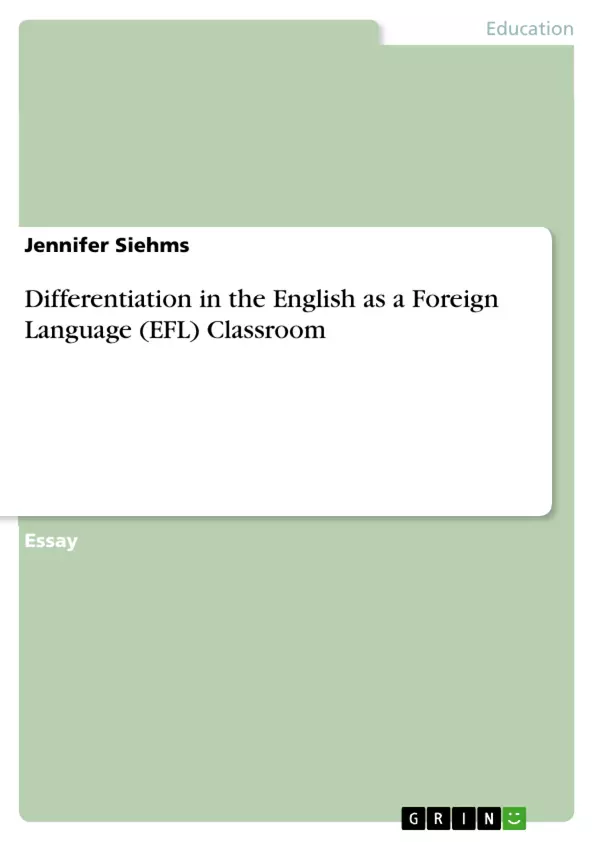The importance of differentiation should be clear to every teacher. In their classes they will always be confronted with heterogeneity, differentiation is the only way to deal with this fact. Often heterogeneity is seen as a problem, homogeneous learning groups are wanted. But can heterogeneity only be understood as a problem? Or can it even be a chance?
Heterogeneity can also be seen as a totally normal and even wanted starting point from teaching, learning and education. Differences between the pupils in a class are normal, in relation to their age, their intellectual capacity, their ethnical background and much more. It is a pedagogical duty to handle this diversity as a chance and as an enrichment for the whole group. Teaching must intentionally be planned considering the inner heterogeneity, by the use of variety of methods, differentiation and individualized learning (cf. Tillmann 2007).
The following essay will sum up two articles and one chapter about differentiation in the EFL classroom, it follows a short discussion of the topic and then it ends with the final conclusion. After reading the essay everybody should have a fundamental overview to the topic and should be able to understand that differentiation is indispensible in the EFL classroom.
Inhaltsverzeichnis (Table of Contents)
- 1 Introduction
- 2 Summary of articles
- 2.1 Hass, Frank (2008): „Keiner wie der andere. Im differenzierenden Unterricht Lernprozesse individualisieren“
- 2.2 Mindt, Dieter; Wagner, Gudrun (2009): „Differenzierung“
- 2.3 Böttger, Heiner (2012): „Differenzieren? In MEINER Klasse geht das nicht!“
- 3 Discussion
- 4 Conclusion
Zielsetzung und Themenschwerpunkte (Objectives and Key Themes)
This essay aims to provide a comprehensive overview of differentiation in the English as a Foreign Language (EFL) classroom. It examines the concept of differentiation, its significance in handling learner heterogeneity, and its practical implications for teachers. The essay summarizes key insights from two articles and one chapter focusing on differentiation in EFL teaching.
- The importance of differentiation in addressing learner heterogeneity in EFL classrooms.
- The need for individualized learning approaches to cater to diverse learning styles and needs.
- Strategies for differentiating instruction in terms of quality, quantity, methods, media, and social learning arrangements.
- The role of motivation and interest in fostering successful learning in a differentiated environment.
- The challenges and opportunities associated with implementing differentiation in EFL classrooms.
Zusammenfassung der Kapitel (Chapter Summaries)
The essay begins with an introduction that highlights the importance of differentiation in EFL classrooms, emphasizing the need to embrace learner heterogeneity as a valuable asset. This introduction lays the groundwork for the subsequent analysis of articles and chapters related to differentiation.
The "Summary of articles" section presents key findings from two articles and one chapter. The first article, by Frank Hass (2008), discusses the challenges and opportunities of addressing learner heterogeneity in the EFL classroom. It underscores the need for individual learning approaches and highlights strategies for qualitative and quantitative differentiation.
The chapter by Mindt and Wagner (2009) provides a comprehensive overview of differentiation in EFL teaching, emphasizing the importance of creating motivating and engaging learning experiences. The chapter offers practical strategies for differentiating instruction based on quality, quantity, methods, media, and social learning arrangements.
Schlüsselwörter (Keywords)
The primary focus of this essay is on differentiation in the English as a Foreign Language (EFL) classroom. Key concepts explored include learner heterogeneity, individualized learning, qualitative and quantitative differentiation, varied methods and media, and the importance of motivation and interest in EFL teaching. This essay emphasizes the need for teachers to embrace differentiation as a vital tool for fostering effective learning in diverse EFL classrooms.
Frequently Asked Questions
What is differentiation in the EFL classroom?
Differentiation is a pedagogical approach to handle learner heterogeneity by using a variety of methods and individualized learning to meet diverse student needs.
Is heterogeneity a problem in English teaching?
While often seen as a challenge, heterogeneity can be viewed as a normal starting point and an enrichment for the whole group if handled correctly.
What are the strategies for differentiating instruction?
Instruction can be differentiated in terms of quality, quantity, methods, media, and social learning arrangements.
Why is motivation important in differentiated learning?
Motivation and interest are crucial for fostering successful learning experiences in an environment where students work at different levels or speeds.
What does Frank Hass (2008) say about individualizing learning?
Hass emphasizes that because no two learners are alike, teachers must individualize processes to address the qualitative and quantitative differences in learning.
- Arbeit zitieren
- Jennifer Siehms (Autor:in), 2017, Differentiation in the English as a Foreign Language (EFL) Classroom, München, GRIN Verlag, https://www.grin.com/document/456960



